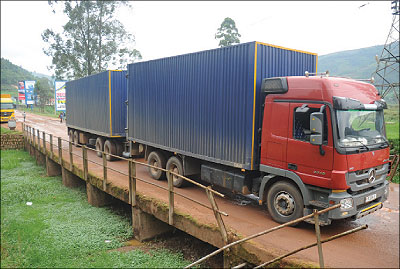The proposed single customs territory poses a big threat to the country’s economy if adopted without thorough deliberations, according to several senior government officials.


The proposed single customs territory poses a big threat to the country’s economy if adopted without thorough deliberations, according to several senior government officials.The officials from the Ministry of East African Affairs and the Private Sector Federation made the remarks Monday during a round table debate themed; "Implications of the destination model on Rwanda’s economy”. It drew economic experts from various institutions, East African Legislative Assembly members and officials from the EAC Secretariat.The Heads of State Summit on April 28, 2012 adopted in principle the destination model of Single Customs Territory (SCT) where assessment and collection of revenue would be made at the point of entry and remitted to the destination partner statesDuring the debate, EAC consultant, John M. Kasanga, who backed the model, made a presentation on its workings to the participants.He said that within the Single Customs Territory, members enjoy duty free, quota free trade among themselves, citing free movement of goods as the region moves towards becoming one country. Customs checkpoints of internal borders would also be abolished to allow for free movement of goods.However, many participants remained unconvinced by the model.While presenting the implication of the model on the country’s economy, Bill Kayonga, the Permanent Secretary in the EAC Ministry, highlighted that the model involves shifting customs operations from Rwanda to the ports of Mombasa, Kenya and Dar es Salaam, Tanzania, both of which account for 99 percent of Rwandan total imports."Moving of business to the ports of Mombasa and Dar –Es Salaam by customs, clearing agencies, bonded warehouses, banks and insurance companies will lead to unemployment, revenue loss and adverse multiplier effects,” he observed.According to the model, certificates of origin of goods would be scrapped, which, according to Kayonga, would lead to the suffocation of local industries as well as making the region a dumping ground for unnecessary products.He further proposed that for the single customs territory to be beneficial to the country, non-tariff barriers should be removed while allocating a terminal to Rwanda to clear goods destined for the country at the ports.An official from the Rwanda Private Sector Federation, John Bosco Kanyangoga, raised fears that if the customs operations are shifted to ports, the local business community, especially clearing and forwarding agents, may be declared redundant.He further called for the full implementation of the EAC dispute resolution mechanism to protect local businesses."The private sector thinks that it would be better to initiate the compensation scheme to business operators who will lose their businesses as a result of the single customs territory,” he said.He added that the business community was still concerned with poor performance at the two regional ports. He proposed the regionalisation of the two facilities under the secretariat to enhance operations. Participants also called for further negotiations to build a proper single customs territory model that suits regional integration without consequences for member states.


